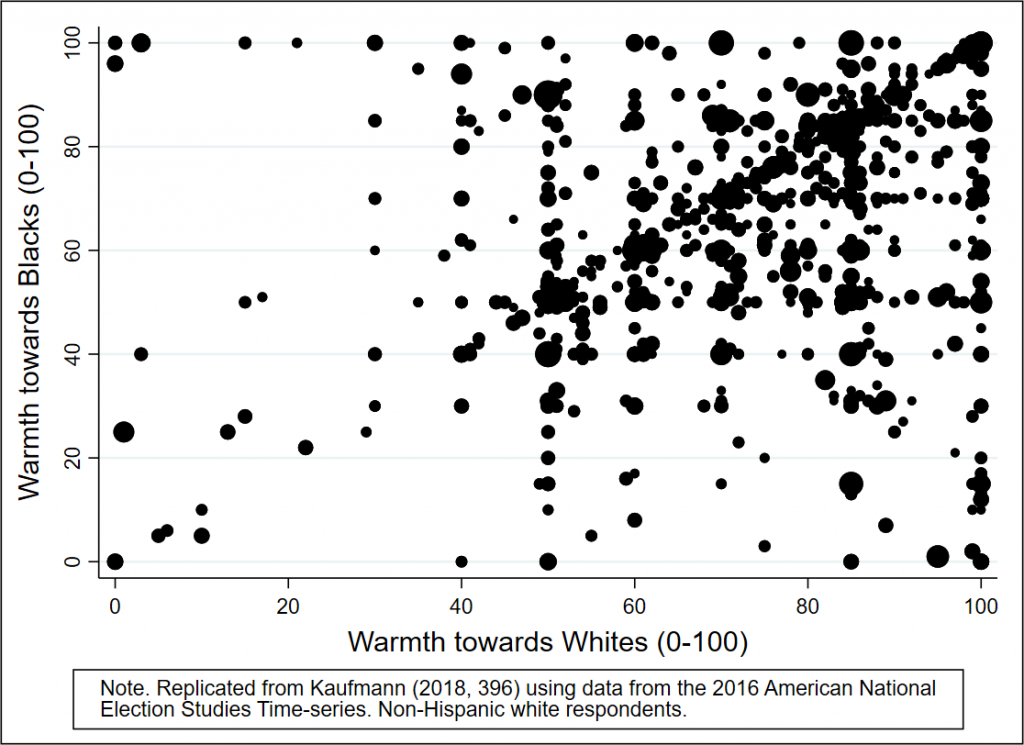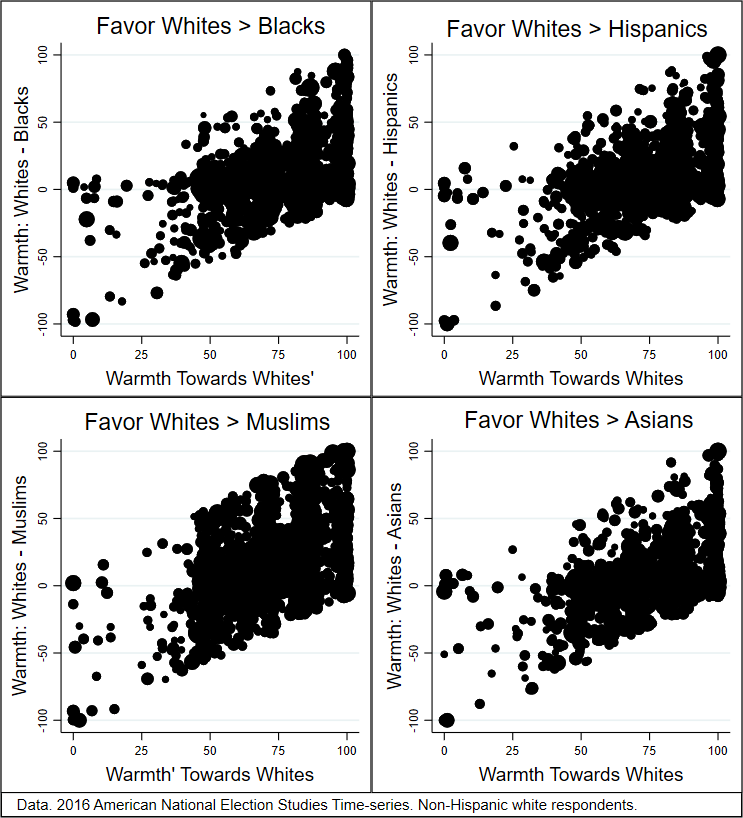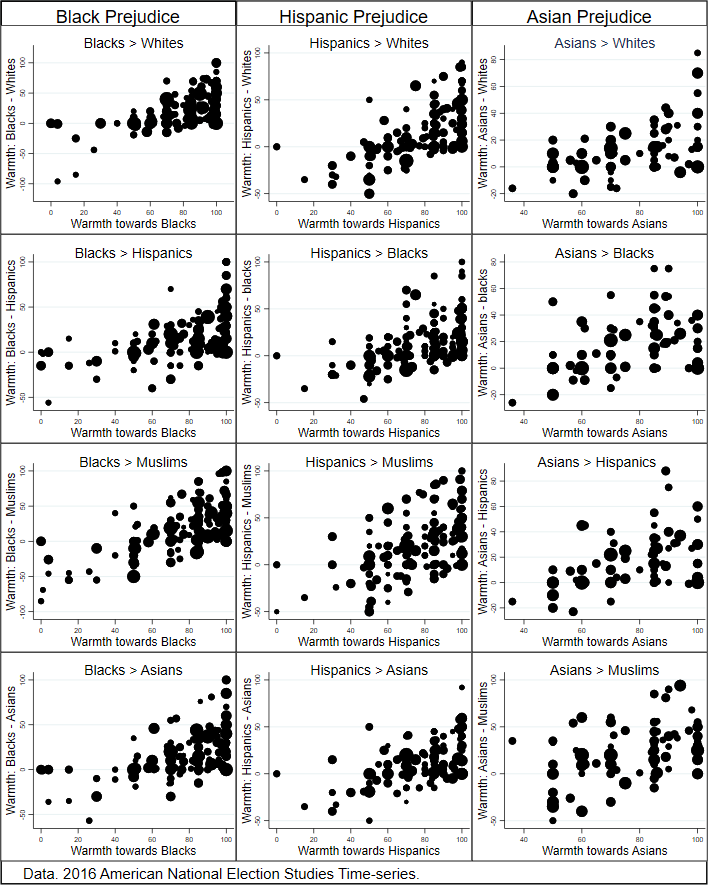By Christopher Schorr, PhD
July 22, 2021
This post follows my recent summary of my second dissertation chapter where I consider conservatism in the context of group attitudes (“tribalism”). My research proceeds from what I take to be the conventional or “common sense” view of group attitudes; namely, that ingroup identification and affect are linked with ingroup preference or “prejudice.”
This dynamic is often considered in the context of race; however, it generally applies wherever “ingroups” and “outgroups” are present. For example,
- a patriot identifies with and loves his country and so prefers it to other countries,
- a sports fan does the same with respect to her team,
- someone who identifies strongly with an organization (e.g., the Marine Corps) will favor that organization over rival organizations (e.g., the Army or Navy), and
- a religious observer will favor his faith over other faiths.
Preference for one’s own (prejudice) demonstrates ingroup commitment, loyalty, or love. The resulting tension between ingroup and outgroup sentiments is well documented in the academic literature (see: social identity, realistic group conflict, ethnocentrism, authoritarianism, and social dominance).
To this very general overview of group attitudes, we can add Marilyn Brewer’s insight that the prejudice that results from ingroup love is distinct from hatred of outgroups. A patriot, religious observer or club member need not hate other countries/faiths/clubs simply because he loves his own. Brewer’s research thus allows for a less bleak understanding of group attitudes than earlier work which often treated group conflict (including war) as all-but inevitable; but, how much less bleak? This question turns out to be tremendously important.
ASSIMILATION AND IT’S DISCONTENTS
Our understandings of group attitudes inform our efforts to maintain social peace. These understandings take on greater importance as our (Western) nations become increasingly diverse. If we believe, for example, that group attitudes fracture society and generate group-based conflict (aka “Balkanization”), we must devise approaches to mitigate these harms even as we reap diversity’s benefits.
The quintessential such approach is assimilation, a process by which one group becomes more like another by absorbing its culture, customs, and traditions. From the perspective of ingroups, assimilation transforms outgroup members into ingroup members. This recategorization essentially hijacks the phycological processes responsible for prejudice and redirects them towards tolerance and unity (see also Schorr, Ch 2). The beauty of re-categorization is that it reduces prejudice by working with rather than against human nature. It doesn’t require people to transcend evolution’s impact on psychology or to somehow overcome the limitations of cognition itself – i.e., our tendency to overemphasize intra-category similarities and inter-category differences.
The process of assimilating immigrants and other minorities into the national ingroup involves discouraging ethnic “identity politics” and promoting the shared national identity. This approach is made explicit in Teddy Roosevelt’s famous “Hyphenated Americans” speech which criticizes immigrants who refuse to assimilate while vigorously defending assimilated immigrants as no less “American” than natives. Assimilation can be described as “conservative” in that it more associated with the political right, but also in that it is fundamentally risk-averse and oriented towards preserving (conserving) the nation-state.
Assimilation has its critics, as one might expect, given the costs it imposes on newcomers/minorities but also on natives/majorities. In terms of the latter group, the quintessentially American “melting pot” formula is more costly to natives than more restrictive approaches (e.g., France) that place greater emphasis on preserving continuity in the national culture. To be sure, assimilation demands more of immigrants than of natives, but immigrants have homelands where their cultures are preserved “intact.” Nations that receive immigrants are forever changed. Immigration imposes cultural loss and alienation on people in their own homelands. This arguably makes assimilation a moral obligation for immigrants.
The costs imposed by assimilation on immigrants and other minorities are substantial. Immigrants choose and so, presumably, prefer their destination countries to their former homelands, but it doesn’t follow that they desire to rid themselves of their cultural inheritances. Moreover, even those committed to assimilation may resent being pressured to assimilate by natives, particularly if they sense that other groups are treated differently.
For minority natives, by contrast, assimilation has much less to do with joining the nation. Black Americans, for example, are already “American,” in their own eyes and in the eyes of others, whites included. In this context, assimilation is more like “becoming white” – a practical impossibility for most, given how ancestry markers inform popular, albeit discredited understandings of race. Some minorities (immigrants included) understandably feel that denying recognition to minority cultures is tantamount to denying dignity to minorities themselves.
MULTICULTURALISM AND ITS HYPOCRISIES
What if this burden could be avoided? Multiculturalism rejects assimilation and encourages minorities to maintain their cultural distinctiveness. The melting pot thus gives way to a “salad bowl” where groups “…coexist in their separate identities like the ingredients in a salad, bound together only by the ‘dressing’ of law and the market.” So constituted, the nation-state – the unity of a single people with a single state – is transformed into a multinational state. E pluribus unum becomes e unum pluribus.
Multiculturalism is also defined by its double standards. As described by Eric Kaufmann in Whiteshift, expressions of ingroup pride and promotions of group interests in politics (identity politics) are encouraged for minorities but discouraged for majorities. Majorities have taken note of this asymmetry and their resentment of it spills over into politics (e.g., Swain 2002, Ch 11). As Western (white) majorities decline in number and become more racially conscious, the continued viability of multiculturalism is in doubt.
Multiculturalism’s critics typically respond to these shortcomings by proposing the following,
- We should stop dividing the nation through identity politics, and
- We should recommit to assimilation and, especially in the US case, to a vision of national solidarity derived from shared civic institutions and values.
This is emphatically not Kaufmann’s perspective; indeed, Kaufmann rejects civic nationalism for obstructing what he considers to be the legitimate identity concerns of minorities and majorities. His proposal (“multivocalism”) would instead normalize majority-group identity politics and incorporate it into the existing, now symmetrical, multiculturalism framework.
The tradeoff would be the destruction of present-day, authoritative understandings of national identity. Stated differently, white Americans would get to practice identity politics no less than other groups; however, the United States would cease to be defined by the values and traditions (e.g., the American Creed) of what was, until recently, the American people. This is because those values and traditions would now be treated as belonging to white Americans rather than to Americans per se. American history would become white-American history, American ideals would become white-American ideals, and so on. All groups would be free to chart their own courses and American identity would have no (or perhaps, very few) defining characteristics.
Remarkably, Kaufmann views his approach as posing little risk to national integrity. He argues that Balkanization concerns are illusory because, as Brewer demonstrates, ingroup love has little to do with outgroup hate. He illustrates this point using “feeling thermometer” evaluations from white survey respondents (see Figure 1). If indeed whites who like whites more (ingroup love) also like blacks more (outgroup love) then we surely have nothing to fear from more robust expressions of identity and group interests in politics.

A ROAD NOT WORTH TRAVELLING
The problem with Kaufmann’s proposal is that it sidesteps the issue of prejudice. Hating outgroups is a problem, to be sure; but prejudice (especially racial prejudice) is also a problem, regardless of whether it derives more from outgroup hatred or from ingroup love. Racial discrimination equally involves favoring some groups and disfavoring others; after all, how can you discrimination against group X without also discriminating in favor of group non-X? Historically, institutional racial oppression in America (slavery and Jim Crow) harmed blacks while also benefitting many whites materially and psychologically.
Taking the same survey data used in Figure 1, Figure 2 demonstrates that ingroup love is tightly associated with prejudice. This is to say, whites become more prejudiced against blacks as they become more pro-white. This is racial prejudice, plain and simple. Its presence in survey data is exactly as predicted by social identity theory. Moreover, this phenomenon is not exclusive to whites (see Figure 3).


Kaufmann’s approach to managing diversity could be catastrophic. Multivocalism aims to reduce racial tension by incorporating racial interests into politics – releasing the pressure, in effect – but this approach would likely increase racial conflict. Consider, for example, longstanding debates over taxes and spending. These are considered “fiscal” issues, even though some groups are taxed more than others, and some groups receive greater income supports than others. As viewed through the lens of racial identity, fiscal issues are transformed into zero-sum racial conflicts over scarce resources. One shudders to think how the politics of crime and policing would unfold. Admittedly, this framing has been popular on the left for some time but less so on the right where racial interest arguments are still stigmatized, notwithstanding polemical claims to the contrary.
As this changes, overt discrimination in public policy would stage a comeback. State and provincial majorities could, per Kaufmann’s reasoning, defend discriminatory policies on “pro-ingroup” rather than “anti-outgroup” grounds. Separatist movements are on the table as well. Such movements are rising globally and are frequently bloody affairs. To date, proposals to carve white and Hispanic ethno-states out of American territory have (mercifully) garnered little traction but any shift from American to racial conceptions of the ingroup would bring such projects closer to fruition.
To be clear, it is not my intention to impugn Kaufmann’s motives; he seems sincerely concerned about the burdens existing arrangements place on minorities and majorities alike. His approach is humane but flawed. There is no escaping the fact that what you define you also limit. Defining the boundaries of the nation limits its membership and so imposes costs on new (immigrants) and other marginal members (native minorities). Kaufmann’s response to this constraint is, in effect, to undefine the nation.
Left undefined, Western nation-states could fracture and dissolve. Then, after much bloodletting, they would be succeeded by new, more homogenous nation-states. These states would likewise have minority groups, as all states do, and those groups would chafe, as others have, under the weight of dominant national cultures. This is a problem inherent to nation-states. Assimilation is how you mitigate it.
Perhaps assimilation is unfair to minorities and perhaps it is unfair to majorities. Regardless, assimilation keeps the nation intact. Survival takes precedence over other concerns, fairness included. A proper understanding of group attitudes should inform a more robust defense of assimilation and a more jaundiced view of approaches that divide nations along ethnic and other identity lines.
I have to thank you for the efforts you have put in penning this website. I’m hoping to view the same high-grade content from you later on as well. In truth, your creative writing abilities has encouraged me to get my own, personal blog now 😉
Thank you so much Lacy. I’m glad you enjoyed this piece. Best of luck with your blog! I’m sure it will be great 🙂
Thanks for your blog, nice to read. Do not stop.
Much obliged!